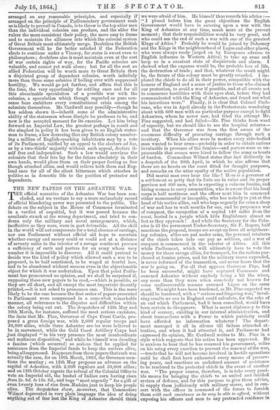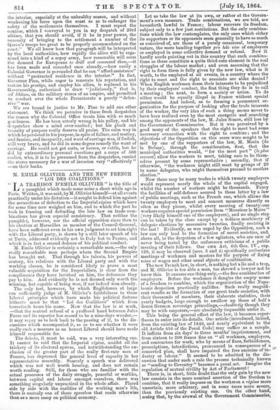THE NEW PAPERS ON THE ASHANTEE WAR. T HE official narrative
of the Ashantee War has been con- cluded, and we venture to say a more melancholy record of official blundering never was presented to the public. The debate on the subject in the . House of Commons terminated in- a verdict of acquittal, but it was passed because the assailants struck at the wrong department, and tried to con- demn only the military and naval arrangements, which, ineffective as tbey were, were in part defensible. All the skill in, the world will not compensate for a total absence of carriage, nor can Parliament without official aid hope to ascertain whether energy and money could or could not at a distance or seventy miles in the interior of a savage continent procure a sufficiency of carts and porters for an army whose very number it is impossible to discover. All it could pretend to decide was the kind of policy which allowed such a war to be proposed, to be half sanctioned, to be waged at fearful loss, and to be abandoned without success even in the objectionable object for which it was undertaken. Upon that point Parlia- ment has pronounced no opinion, and we shall be surprised if, supposing these. new papers to be read,—which is possible, as they are all short, and all except the most important decently printed,—it is not asked to pronounce one. This is the more likely to be the case because the first series of papers presented to Parliament were compressed in a somewhat remarkable manner, all references to the disputes and difficulties within - the colony being cut out. The despatches of 12th May and 10th March, for instance, suffered the most serious excisions, the facts that Mr. Pine, Governor of Cape Coast Castle, pro- posed a great foreign war, with 2,000 regular troops and 50,000 allies, while three Ashantee armies were believed to be in movement, while the Gold Coast Artillery Corps had just displayed "in his very presence the most insubordinate and mutinous disposition," and while he himself was dreading a famine (which occurred) so serious that he applied for assistance from the Imperial funds to keep the natives alive, being allsuppressed. It appears from these papers thatsuch was actually the case, for on 10th March, 1863, the Governor men- tions the mutiny ; on 12th May proposes an advance on the capital of Ashantee, with 2,000 regulars and 50,000 allies; and on 12th October regrets the refusal of the Colonial Office to vote an Imperial aid, the bushel of Indian corn having risen from 2s. 6d. to 13s. 6d., and begs "most urgently" for a gift of even twenty tons of rice from gadeira just to keep his people alive. The despatches show, moreover, that Commodore Wilmot deprecated in very plain language the idea of doing anything out of fear lest the King of Ashantee should think we were afraid of him. He himself thus records his advice :- " I placed before him the great objeotions the English Government would have in entering upon a war with the King of Ashantee at any time, much more at the present moment; that their responsibilities would be very great, and who could see the end of such a war with one of the greatest Kings of Africa ? Probably he would be joined by Dahomey and the Kings in the neighbourhood of Lagos and other places, who were always ready (urged on by Europeans adverse to English influence in Western Africa) to take up arms and keep ns in a constant state of disquietude and alarm. I showed what the expense would be, the probable loss of life, the destruction of trade ; and that, whatever the result might be, the future of this colony must be greatly retarded. I im- plored the chiefs to do all in their power, compatible with the honour of England and a sense of justice to those who claimed our protection, to avoid a war if possible, and at all events not to commence hostilities with their eyes shut, before they had communicated with the King of Ashantee, and found out what his intentions were." Finally, it is clear that Colonel Coch- rane, who was in April already in the Protectorate wandering about with 600 men with no particular purpose except to fight Asbantees, whom he never saw, had tried the attempt Mr. Pine suggested, and had failed—Mr. Pine thinks from want of capacity, but we should like to see the hospital returns— and that the Governor was from the first aware of the enormous difficulty of procuring carriage through such a territory. When his allies were in motion every able-bodied man wanted to bear arms—probably in order to obtain rations invaluable in presence of the famine—and porters were so un- procurable that women were hired to follow the army as beasts of burden. Commodore Wilmot states that fact distinctly in a despatch of the 20th April, in which he also affirms that there are no beasts on the coast fitted for draught purposes, and remarks on the utter apathy of the native population. Did mortal man ever hear the like ? Here is a governor of a settlement so petty that its forts are in ruins and its proper garrison not 400 men, who is expecting a ruinous famine, and hiring women to carry ammunition, who is aware that his local corps is half mutinous and the officer next him in command either unsuccessful or incapable, who has nobody to put at the head of his native allies, and who begs urgently for even a sloop of war and has to wait months for one, and he proposes a war of conquest, the occupation of a capital 140 miles from the coast, buried in a jungle which kills Englishmen almost as fast as they approach ! And while the Secretary for the Colo- nies is ill the permanent Under-Secretary, Sir F. Rogers, half sanctions the proposal, troops are swept up from all neighbour- ing colonies, allies are put under arms, the personal retainers of thechiefs taken into our pay as soldiers, and a war of conquest is commenced in the interior of Africa. All this while Parliament, which will ultimately have to vote the money for these savage allies, for transport, for the rations pur- chased at famine prices, and for the military stores expended, is never informed of the transaction, and never hears that the war is going on. For all that appears Governor Pine, had he been successful, might have captured Coomassie and annexed Ashantee without anybody being a bit the wiser, any more than they were when somebody not known for some undiscoverable reasons annexed Lagos on the same coast. We might have been burdened, as Mr. Pine expected we should be burdened, with a " serious and lingering war," invol- ving results no one in England could calculate, for the sake of an end which Parliament, had it been consulted, would have been certain to disapprove. What is secret diplomacy to this kind of secrecy, existing in our internal administration, and about transactions with a Power to which publicity could have afforded no information whatever ? The depart- ment managed it all in silence till failure attracted at- tention, and when it had attracted it, and Parliament had expressed its opinion, Mr. Cardwell writes to Mr. Pine in a style which suggests that his action has been approved. He is anxious to hear that he has resumed his government, relies on his using every exertion to prevent the renewal of the war, —trusts that he will not become involved in hostile operations until he shall first have exhausted every means of preserv- in..Q peace, and sanctions an undefined amount of assistance to be rendered to the protected chiefs in the event of another war. "The proper course, therefore, is to take every possi- ble means for bringing the chiefs to an united and decided system of defence, and for this purpose to give them advice, to supply them judiciously with military stores, and in con- cert with the officer in command of the forces to furnish them with such assistance as he may be able to afford, without exposing his officers and men to any protracted residence in the interior, especially at the unhealthy season, and without weakening his force upon the coast so as to endanger the safety of the settlements themselves. I must repeat the caution, which I conveyed to you in my despatch of 23rd ultimo, that you should avoid, if it be in your power, the necessity of bringing to the settlement a number of the Queen's troops too great to be properly accommodated on the coast." We all know how that paragraph will be interpreted by the local authorities, how rapidly the allies will be orga- nized into a kind of a sepoy army, how reasonable will seem the demand for Europeans to drill and command them,—it has been made and conceded once already,—how easily a Culouial Governor is persuaded that he can " afford assistance" without " protracted residence in the interior." In fact, Governor Piue, while eager to renovate his reputation, and restore his prestige, and employ his allies, is replaced in his Governorship, authorized to draw "judiciously," that is, ad libitum, on the military stores of an empire, and permitted to conduct over the whole Protectorate a purely " defen- sive " war.
We are bound in justice to Mr. Pine to add one other statement. We think we perceive in these fresh despatches the reason why the Colonial Office treats him with so much gentleness. He has been utterly wrong in his policy, and his despatches show a mind over-excited ; but his pluck and tenacity of purpose really deserve all praise. The calm way in which he persisted in his purpose, in spite of failure, and mutiny, and famine, and incapacity, and want of carriage was, if foolish, still very brave, and he did in some degree remedy the want of carriage. He could not get carts, or horses, or cattle, but he did by extraordinary personal exertions get ,a corps of 500 coolies, who, it is to be presumed from the despatches, carried the stores necessary for a war of invasion very " effectively " —on their backs.































 Previous page
Previous page